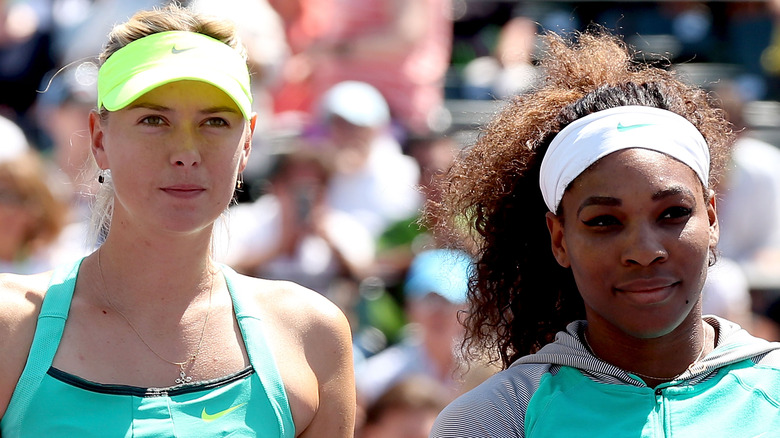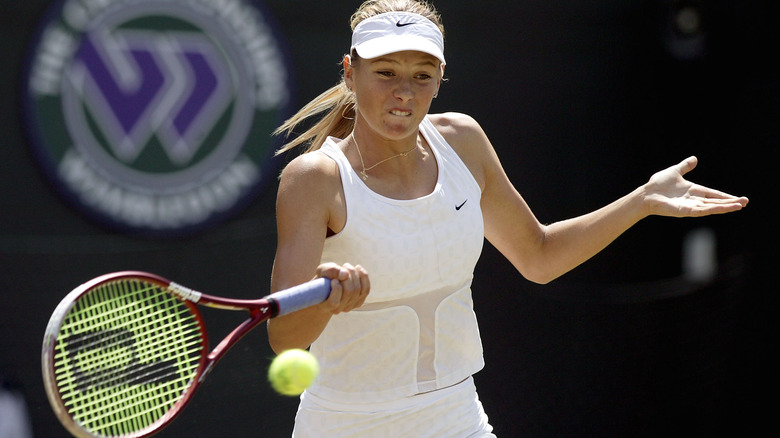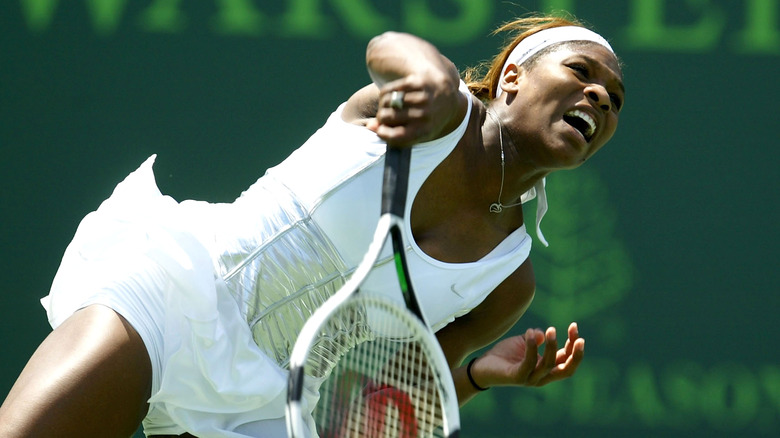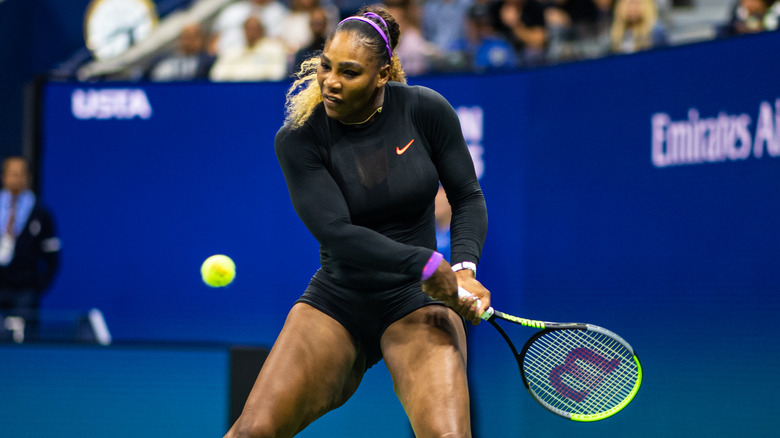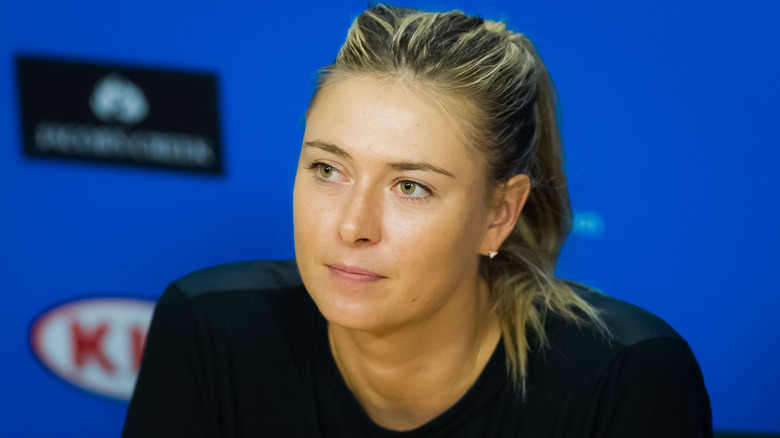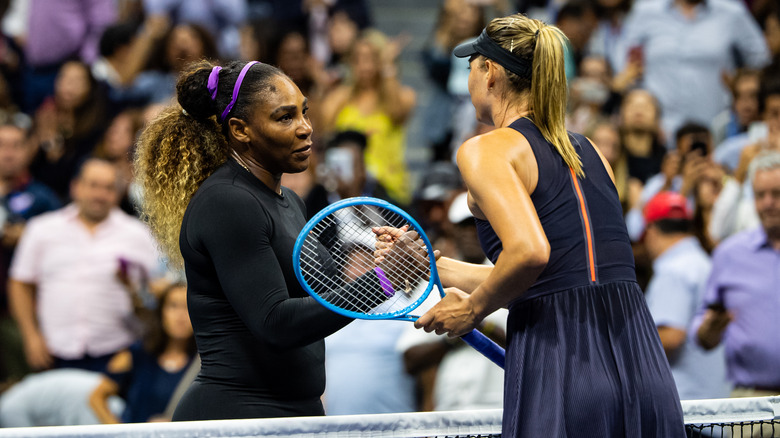Serena Williams' Rivalry With Maria Sharapova Explained
In the spring of 2004, Serena Williams had been away from the women's tennis tour for eight months (via The New York Times). A partial tear in the tendon of her left knee required surgery, per USA Today. What was initially supposed to be an absence counted in weeks turned into months. As the recovery time expanded, murmurs among players, tennis executives, and the media began to question Williams' interest in returning to the sport. "I watched a little bit of the [U.S.] Open when I could, but I didn't put it on my schedule to be home like I do with 'Top Model' and 'American Idol,'" she told The New York Times. "Obviously, I have to watch my competition. I have tapes and films. But it was kind of boring. I hate to say it."
Williams chose the tournament in Miami — one of the sport's biggest tournaments — to return to the court and quiet her critics. In most of her matches, she leveled the competition, only dropping a game or two in three of her faceoffs, including the finals against Elena Dementieva of Russia, whom she beat 6-1, 6-1 (via Tennis Canada). In retrospect, however, there was a notable match in the fourth round. That's when Williams faced Maria Sharapova, who had been steadily moving up the ranks during Williams' absence. The 16-year-old Russian, who had been training in Florida since she was 7 years old, had climbed into the top 25 in the rankings. Their first meeting wasn't a blowout, but a decisive win for Williams, 6-4, 6-3 (per USA Today).
Rematch at Wimbledon
Just a few months after Serena Williams and Maria Sharapova met for the first time in Miami, they found themselves on the court together once again. This time, the stakes were much higher. It was Centre Court at Wimbledon for the finals (via The New York Times). Commentators expected a straightforward win for Williams, who had won the crown jewel of professional tennis the previous two years. But Williams looked nervous facing the now-17-year-old. Sharapova, who was seeded 13th, only needed an hour and 13 minutes to beat a shocked Williams 6-1, 6-4. "She's kind of like me," Williams said (per Tennis.com). "She doesn't back off. She keeps giving it her all." She added: "I put a lot of stress on myself; I think I put too much stress on myself going into it."
Sharapova seemed equally unable to explain exactly how the big win came about. "To tell you the truth, I don't know what happened in the match," the 13th-seeded Sharapova said (via The New York Times). "I don't know what the tactics were. I was just out there. I was just playing." Still, Sharapova said it was her dream to win Wimbledon, even if she didn't know exactly how to handle the gravity of the moment. The trophy presentation created its own uncomfortable circumstance. "I have to take this away for one year, I'm sorry,” Sharapova said as she held the champion's plate. "I know there are going to be so many more moments where we are going to play."
A rivalry in the making?
That next moment came just five months later in Los Angeles in the finals of the WTA Tour Championships, a tournament for eight players at the top of the rankings at the end of the year. From the first ball struck, the match was as close as could be. Serena Williams edged out Maria Sharapova in the first set 6-4 (per Sports Illustrated). Then, an abdominal injury hampered Williams' performance, allowing Sharapova to take the second set more convincingly 6-2. However, Serena adjusted her strategy and surged ahead 4-0 in the third and final set, seemingly ready to take the match. But Sharapova ratcheted up her aggressive play and reeled off six straight games to win the match 4-6, 6-2, 6-4.
Sharapova seemed as shocked as anybody in the post-match interview, saying (via Tennis.com), "So many things are going through my mind right now — you know, the way I just pulled it out and stuck in there. I mean, oh, it's crazy!" With Sharapova leading Williams 2-1 in their head-to-head record, the tennis and marketing worlds began to see — and hype up — a rivalry between the two. It's easy to see why — the two were some of the fiercest competitors on the tour, were physically complete opposites, and didn't seem to like each other much. "With Serena, it probably is the biggest rivalry because we have such great matches," Sharapova told Reuters (per Times of Malta) early in 2005. "It's great for the game. It's amazing."
Is it a rivalry, though?
Although tennis fans were hoping for a rivalry that equaled the one between Chris Evert and Martina Navratilova, the match-up between Serena Williams and Maria Sharapova was emphatically not it. When Sharapova beat Williams in Los Angeles in 2004, it was the last time (via USA Today). There were some epic battles, of course, but there were also some serious trounces where Sharapova only won a few games. One example is their final showdown at the 2019 U.S. Open when Williams beat Sharapova in a night match on Arthur Ashe Stadium, in which Williams needed less than an hour to win 6-1, 6-1 in the first round. That match concluded the 19-match winning streak Williams had over Sharapova, making their head-to-head record 20-2 in Williams' favor, per the International Tennis Federation.
Some consider the so-called rivalry anything but that, given the disparity in wins. They call it a feud or a grudge, making it sound more personal than professional. But as far as tennis legend Chris Evert is concerned, it's a rival based on the sheer intensity of their competitiveness. "I love the Sharapova and Williams rivalry because it's so feisty. It is one-sided but it's very intense," Evert said in an interview (via Sportskeeda). "Both of them are so intense and they're so opposite." Evert added that she tried to avoid commentating their matches: "I kind of want to be a spectator and watch them."
Sharapova has an answer
For many tennis fans — especially Maria Sharapova supporters — it just didn't make sense how such a promising rivalry could end with such a one-sided record. But Sharapova believes she had the answer early on. "In analyzing this, people talk about Serena's strength, her serve and confidence, how her particular game matches up to my particular game, and, sure there is truth to all of that," Sharapova wrote in her 2017 book (via The New York Times), "Unstoppable: My Life So Far." "But, to me, the real answer was there, in this locker room, where I was changing and she was bawling. I think Serena hated me for being the skinny kid who beat her, against all odds, at Wimbledon."
For her part, Serena Williams dismissed the claims Sharapova made in the book, which she wrote while she was serving a doping suspension, suggesting that Sharapova attributed feelings to her that simply weren't there. "I have cried in the locker room many times after a loss, and that's what I have seen a lot of people do. I think it's normal," Williams said, according to Reuters. "It's a Wimbledon final, you know. So it's just, like, I think it would be more shocking if I wasn't in tears." Williams said she thought the moment in the privacy of a locker room should have remained there. "What happens there should definitely maybe stay there and not necessarily talk about it in a not‑so‑positive way in a book," she said, per The Guardian.
A rivalry in dollars
Where Maria Sharapova and Serena Williams were rivals had nothing to do with wins and losses. Per USA Today, Sharapova was earning about $10 million more a year thanks to endorsements. In a 2015 interview with The New York Times Magazine, Williams did her best to take it all in stride. "If they want to market someone who is white and blond, that's their choice. I have a lot of partners who are very happy to work with me," she said. "I can't sit here and say I should be higher on the list because I have won more. I'm happy for her, because she worked hard, too." She added: "We have to be thankful, and we also have to be positive about it so the next Black person can be No. 1 on that list."
Williams became that person the next year, ending Sharapova's 11-year run as the highest-paid among women athletes, according to Fortune. Since then, Sharapova retired from tennis in 2020. Two years later, Williams told Vogue that she was making a "transition" away from tennis, but, per CBS Sports, has hinted toward returning to the court. Williams says she has no hard feelings toward Sharapova. "You know, if anything, I feel like we should encourage each other and the success of one female should be the inspiration to another," she told The Guardian. "I have said that a thousand times. I always get inspired by other women that are doing well."
